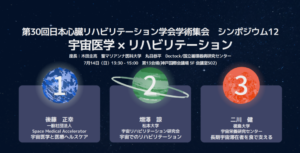Hosted the session in SPACETIDE 2025:Revolutionizing Medicine through Pharma and Healthcare–Space Crossover powered by Space Medical Accelerator

Hello, I am Dr. Goto, representative of Space Medical Accelerator.
From July 8 to 10, 2025, at the Toranomon Hills Forum in Tokyo, we hosted a session titled “Revolutionizing Medicine through Pharma and Healthcare–Space Crossover powered by Space Medical Accelerator” at SPACETIDE 2025, where leading players in the pharmaceutical healthcare space discussed space business opportunities.
SPACETIDE is the largest international space business conference in the Asia-Pacific region, launched in 2015. It provides a platform for top leaders from various countries and industries to engage in discussion and collaboration with the aim of realizing a future where space transforms all societies and industries and where everyone can enjoy the benefits of space technology and space services.
This year, marking its 10th anniversary, the event brought together over 1,800 participants and more than 200 speakers from around the world to Tokyo during the summer, creating a vibrant atmosphere throughout the event.
On the final day, this session focused on the current state of the global space industry in the pharmaceutical and healthcare sector and how to attract more players in the future. We invited speakers from leading overseas startups and major domestic pharmaceutical and medical device manufacturers to participate in a panel discussion.
We will now provide an overview of the session, focusing on the content of the keynote speech delivered by Goto at the beginning.
1.Current status of the pharmaceutical healthcare sector in the space industry
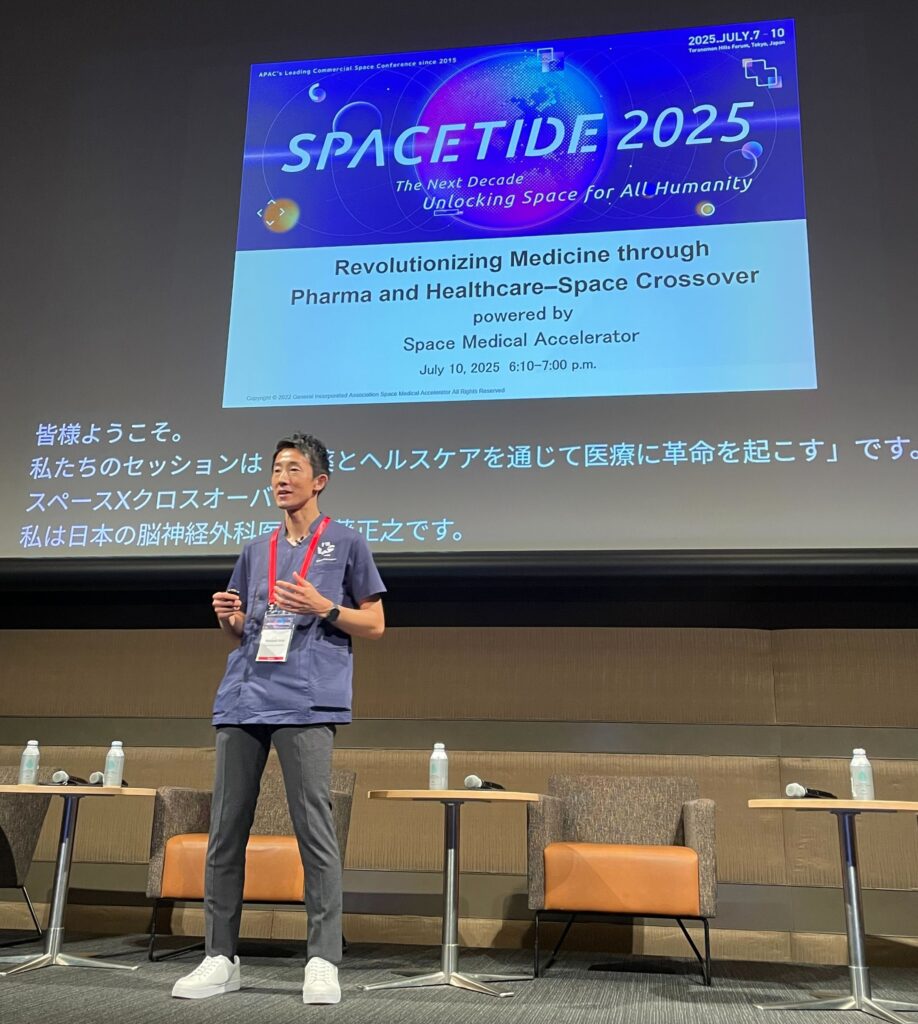
First, we explained why we decided to organize this session.
Nowadays, the Japanese government considers the space business to be a source of new business opportunities and is focusing its efforts on providing nationwide support, including the establishment of a Space Strategy Fund that will invest approximately 1 trillion yen over 10 years starting in 2024 in research and development institutions such as universities and companies.
On the other hand, they declare drug discovery nation and support start-up or pharmaceutical. They also promote creating revolutionary medical devices from Japan as important national policies.
Although the space business and the pharmaceutical healthcare industry are both important industries that will shape the future of Japan, there does not seem to be any significant movement to organically link these two industries in Japan at this point.
In this session, we have organized a discussion to create a new initiative aimed at “combining the pharmaceutical healthcare and space industries to create a new growth industry for Japan.”
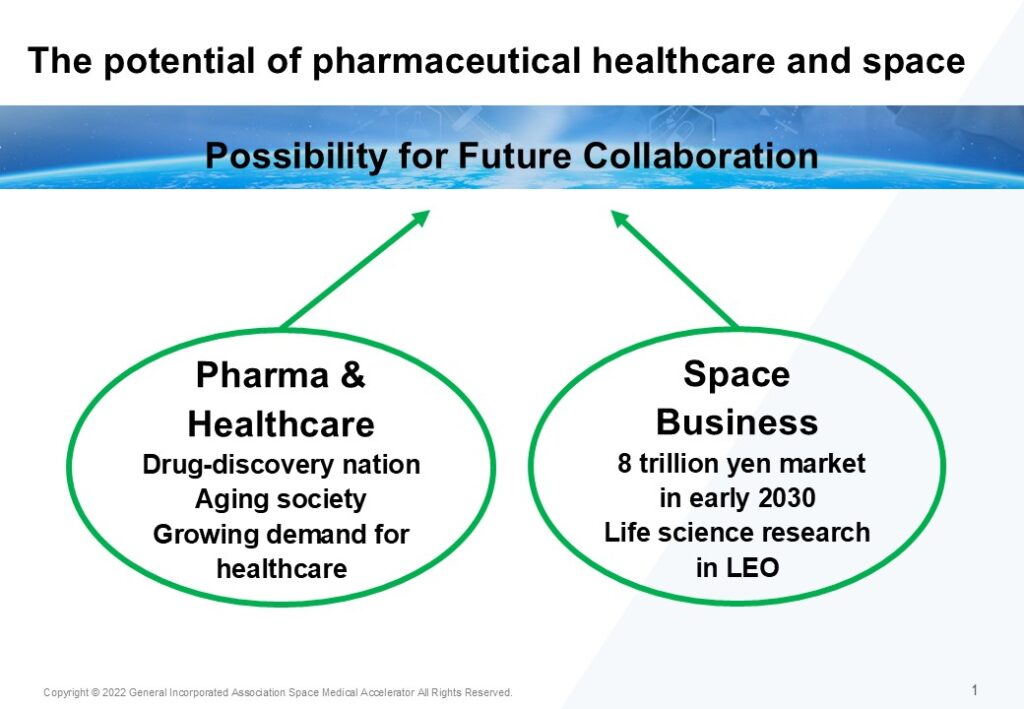
2.Drug Development and Regenerative Medicine Research in Space
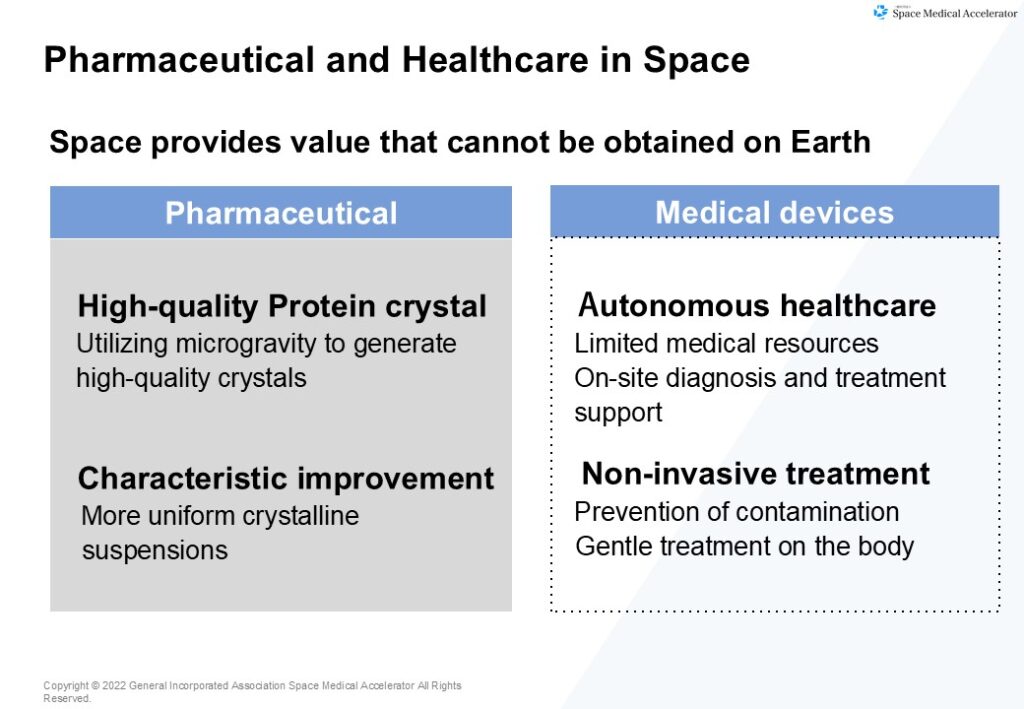
Why are pharmaceutical research and medical devices important in space?
There are two main purposes for pharmaceutical research utilizing microgravity in space.
One is to produce high-quality crystals for structural analysis, and the other is to improve the characteristics of the drug.
Creating high-quality protein crystals is helpful in clarifying the structure of changes in the human body’s proteins which cause diseases and designing candidate materials for therapy.
Improving characteristic is helpful in generating more uniform crystalline suspensions using microgravity and as a result, to improve intravenous injections to subcutaneous injections.
And about medical devices, in places where medical resources are limited like in space, on-site diagnosis and treatment support, in short, autonomous healthcare are required. Microgravity also demands less invasive treatment to avoid contamination or infection.
These requirements are not only important for astronauts, but also for medical care in remote areas such as islands and mountainous regions on Earth.
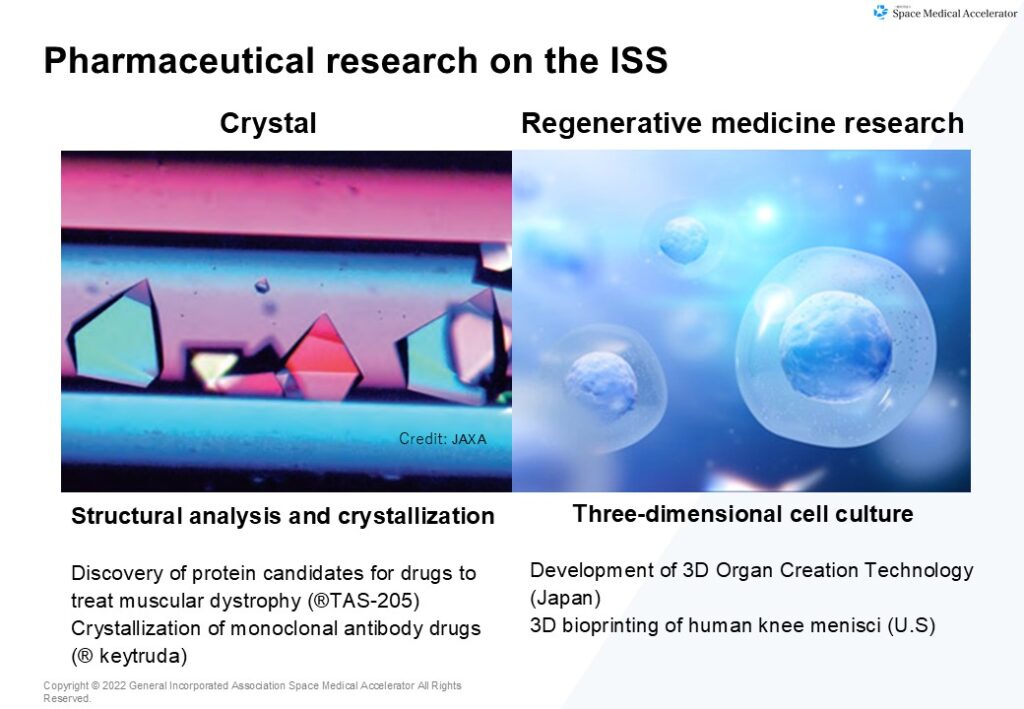
Crystallization experiments in space are being conducted by JAXA and foreign major pharmaceutical companies such as Merck and Eli Lilly or so.
For example, a drug for treating muscular dystrophy utilizing the results of space experiments was designated as an orphan drug in 2023.
Keytruda, a monoclonal antibody used in the treatment of multiple cancers has been identified its condition for obtaining high concentrations in microgravity allowing the company to reformulate Keytruda as a quick injection instead of an IV infusion.
Furthermore, microgravity is also useful for research and development in the field of regenerative medicine.
JAXA is collaborating with academic researchers to develop technologies that will lead to “organ generation” in microgravity. Microgravity is attracting attention as an environment similar to the mother’s womb during fetal development, where organs are formed, and it enables the three-dimensional growth of tissues and organ primordia.
Professor Taniguchi of the University of Tokyo has successfully cultured human iPS cells derived from liver cells, mesenchymal stem cells, and vascular endothelial cells in microgravity and developed them into three-dimensional liver organoids. Furthermore, efforts are underway to connect organoid-to-organoid intercellular interactions to organ generation.
Meanwhile, in the United States, a 3D bioprinter installed on the ISS has successfully generated a human knee meniscus.
3.Possibilities for medical equipment used in space
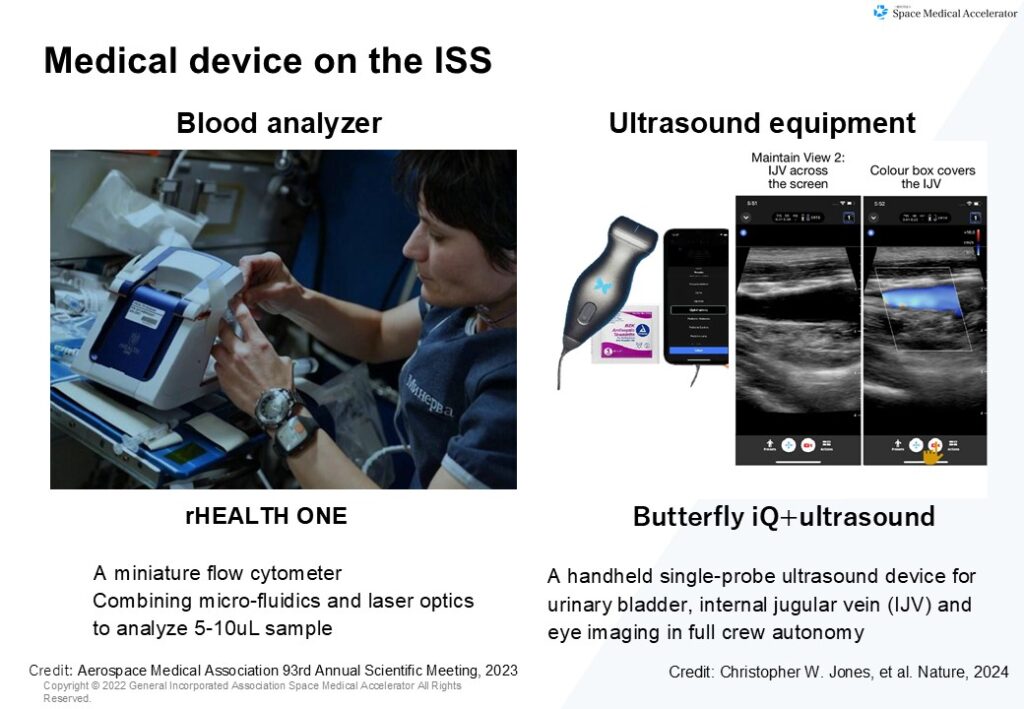
Next, we will show you some with medical diagnostic equipment used in space.
The left side of the figure shows rHEARTH ONE, miniature flow cytometer Combining micro-fluidics and laser optics to analyze 5-10uL sample.
In 2021, during Inspiration 4, the world’s first low-orbit mission with private citizens, four blood samples were collected and analyzed on the ISS, and their diagnostic functions were confirmed to be in good condition after returning to Earth.
The right side of the figure shows the Butterfly iQ+, a handheld ultrasound diagnostic device.
Due to spatial constraints in space, conventional large medical devices cannot be carried onboard. Additionally, astronauts are not medical professionals, so automated diagnostic functions are also required. This mission achieved the world’s first automated diagnosis using an ultrasound device in space, and the device was used in other life science studies such as Polaris Dawn mission in 2024.
4.Toward Space Business and the Future of the Pharmaceutical Healthcare Industry
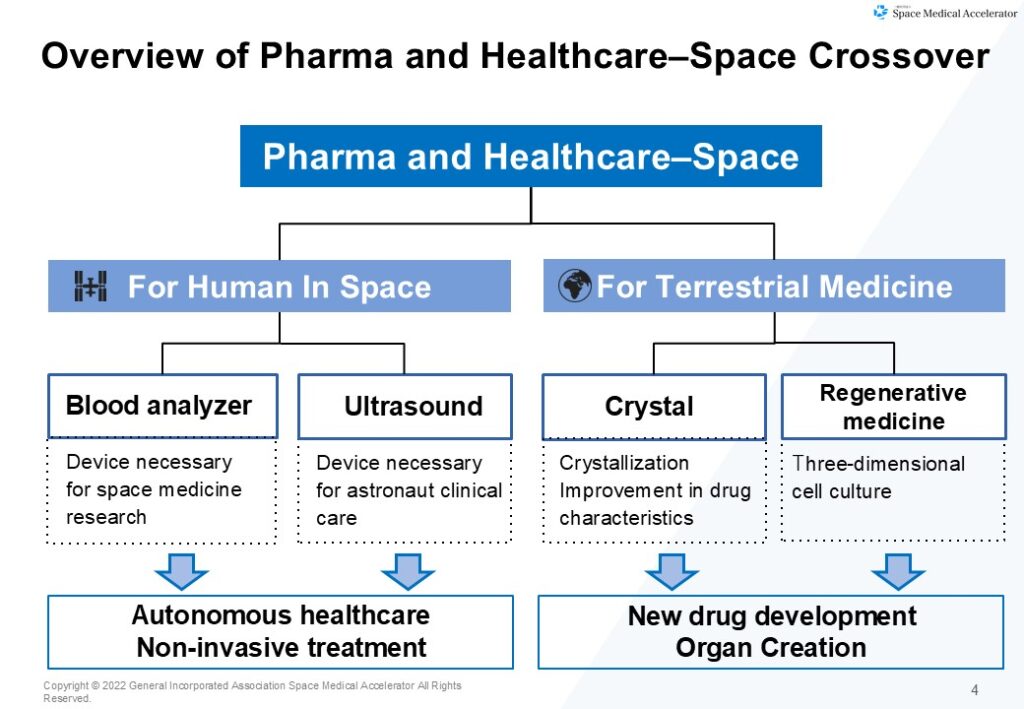
This is the summary slide I mentioned regarding pharma and healthcare in space.
Autonomous and non-invasive medical devices in space are useful not only for astronauts but also for medical care on Earth.
Pharmaceutical research in space has the potential to lead to the new drug development and the possibility of tissue and organ creation.
In this session, Japanese companies Astellas and Sysmex showcased their pioneering vision for the future of the pharmaceutical and medical device industries in space.
From abroad, GattaCo from the US showed us their achievements in the Inspiration 4 mission and creative blood analysis technology, and EXPLOR Biologics from Australia introduced us to the possibilities of regenerative medicine in microgravity.
These discussions have sparked optimism about the potential for the development of the space industry within Japan’s pharmaceutical and healthcare sector.
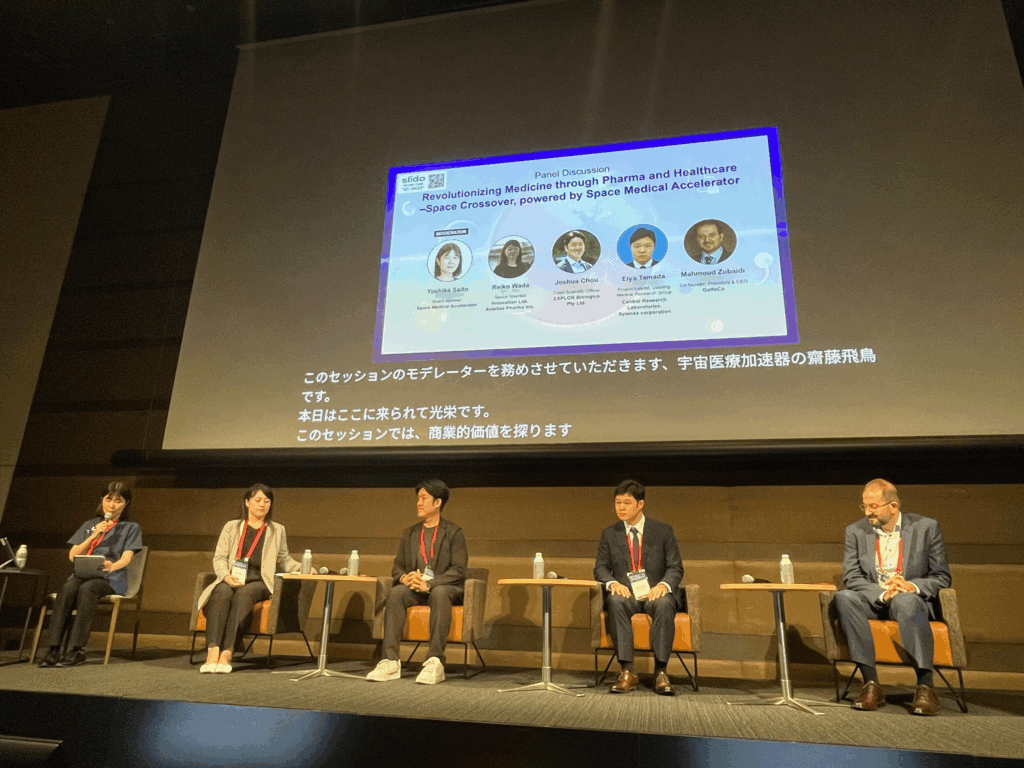
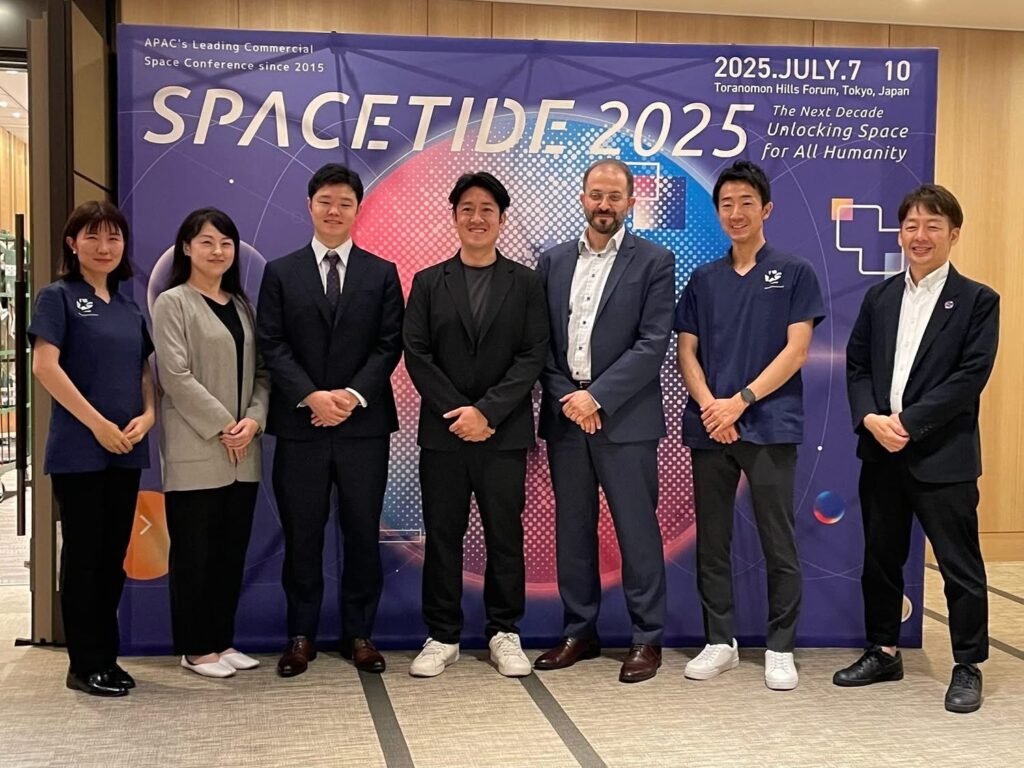
Space Medical Accelerator will continue to provide a forum for discussion and networking to determine what is needed to enable more players to participate in the space business in the medical and healthcare fields and to create new value for future astronauts and ground-based medical care.
We look forward to your continued support of our activities!
Reference
・Christopher W. Jones, et al. Nature, 2024
・Overbey EG, et al. The Space Omics and Medical Atlas (SOMA) and international astronaut biobank. Nature, 2024
・Greshko M. First private spacewalk a success! What the SpaceX mission means for science. Nature, 2024
・Courtney Schkurko, et al. AN IN-SITU LABORATORY ANALYSIS CAPABILITY
FOR EXPLORATION SPACEFLIGHT 2. Aerospace Medical Association 93rd Annual Scientific Meeting, New Orleans, LA May 24, 2023


